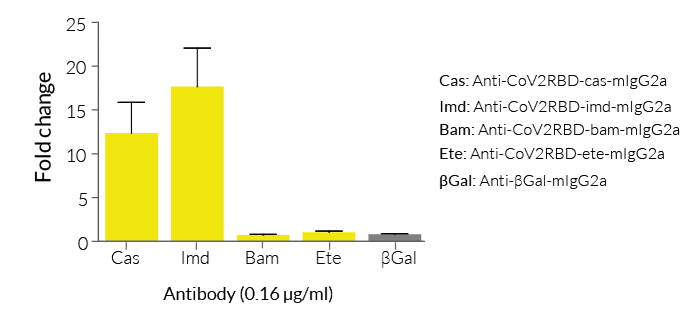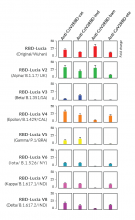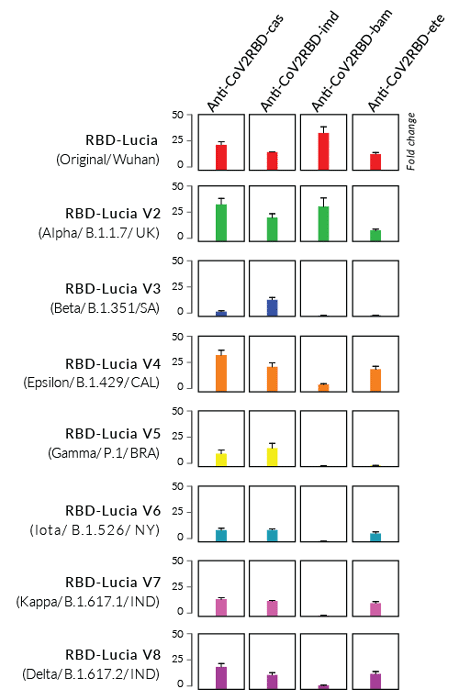Gamma Variant - Luciferase-tagged RBD protein
| Product | Unit size | Cat. code | Docs. | Qty. | Price | |
|---|---|---|---|---|---|---|
|
RBD-LuciaV5 (P.1) Luciferase tagged RBD protein (P.1 variant) |
Show product |
50 µg |
rbd-lucia-v5
|
|
Recombinant RBD fusion protein (P.1 variant - Brazilian origin) for ELISA & LIPS
RBD-LuciaV5 (P.1) (~52 kDa) is a soluble fusion protein composed of the Spike Receptor Binding Domain (RBD) from the SARS-CoV-2 Gamma variant (P.1) fused to a C‑terminal Lucia luciferase tag. RBD-LuciaV5 (P.1) has been specifically designed to assess the binding affinity of anti-Spike antibodies using either ELISA or LIPS (luciferase immunoprecipitation systems) assays [1-3].

RBD-LuciaV5 (P.1) fusion protein for ELISA & LIPS
 InvivoGen also offers:
InvivoGen also offers:
• REGN-10933 & REGN-10987-derived antibodies
• LY-CoV555 & LY-CoV016-derived antibodies
SARS-CoV-2 Spike RBD
RBD-LuciaV5 (P.1) contains the Spike RBD domain, including the receptor-binding motif (RBM) from the SARS-CoV-2 Gamma variant, first reported in Brazil in December 2020 [4]. This variant is classified as a member of Clade 20J / P.1 lineage (Nextstrain/Pango lineage classification). It is characterized by the presence of a number of mutations within the Spike RBD coding region, which are of concern [4].
- K417T, E484K, N501Y
![]() Learn more about the emerging SARS-CoV-2 variants around the world
Learn more about the emerging SARS-CoV-2 variants around the world
Applications
Luciferase-tagged RBD proteins are ideal for studying the binding of anti-spike monoclonal antibodies (mAbs) by solid-phase ELISA and/or solution‑phase LIPS assays, as well as anti‑spike polyclonal antibodies in the sera of recovered COVID‑19 patients and/or vaccinees by LIPS [1-3].
- ELISA: the Lucia luciferase tag provides a larger dynamic range than the commonly used HRP detection.
- LIPS: for the detection of antibodies, against both linear and conformational epitopes.
RBD‑LuciaV5 (P.1) has been generated by recombinant DNA technology, produced in CHO cells, and purified by IMAC (Immobilized Metal Affinity Chromatography) using a C‑terminal histidine tag. Protein size and purity (>90%) have been validated by SDS‑PAGE and the absence of endotoxin contamination has been confirmed using cellular assays.
References:
1. Burbelo, P.D. et al. 2010. Antibody-profiling technologies for studying humoral responses to infectious agents. Expert Rev Vaccines 9, 567-578.
2. Haljasmagi, L. et al. 2020. LIPS method for the detection of SARS-CoV-2 antibodies to spike and nucleocapsid proteins. Eur J Immunol 50, 1234-1236.
3. Liang, Y. et al. 2021. A luciferase immunosorbent assay for quantitative detection of IgG antibodies against SARS-CoV-2 nucleoprotein. J Virol Methods 292, 114141.
4. Faria, N.R. et al. 2021. Genomics and epidemiology of the P.1 SARS-CoV-2 lineage in Manaus, Brazil. Science. doi:10.1126/science.abh2644.
Specifications
RBD-LuciaV5 (P.1)
- Protein construction: RBD [R319-F541] from the Spike glycoprotein fused to a C-terminal Lucia luciferase reporter
- Origin: Gamma Variant (P.1 lineage) | Brazilian origin
- Sequence Reference: GISAID EPI_ISL_811149
- Tag: C-terminal 6x Histidine tag
- Total protein size: 461 amino acids (including the Lucia luciferase)
- Molecular weight: ~52 kDa (SDS-PAGE)
- Purification: Immobilized metal affinity chromatography (IMAC)
- Purity: >90% (SDS-PAGE)
-
Quality control:
- The protein has been validated by ELISA upon incubation with a coated Anti-murine IgG (Fab')2 and a clinically relevant anti-Spike mAb.
- The absence of bacterial contamination (e.g. lipoproteins and endotoxins) has been confirmed using HEK-Blue™ TLR2 and HEK-Blue™ TLR4 cellular assays.
Contents
RBD-LuciaV5 (P.1) contents:
- 50 μg of lyophilized protein
- 1.5 ml of endotoxin-free water
- 1 tube of QUANTI-Luc™ 4 Reagent, a Lucia luciferase detection reagent (sufficient to prepare 25 ml)
![]() The product is shipped at room temperature.
The product is shipped at room temperature.
![]() Lyophilized protein should be stored at -20°C.
Lyophilized protein should be stored at -20°C.
![]() Resuspended protein is stable for up to 1 month when stored at 4°C, and 1 year when stored at -20°C.
Resuspended protein is stable for up to 1 month when stored at 4°C, and 1 year when stored at -20°C.
Avoid repeated freeze-thaw cycles.
Back to the topDetails
RBD-Lucia in ELISA
RBD-Lucia proteins can be used in a luciferase-based ELISA. Unlike a conventional ELISA, the plate is coated overnight with an Anti-human IgG F(ab')2 fragment. Upon addition of anti-spike monoclonal antibodies (mAb), they will bind to this 'capture' fragment through their Fc region, and RBD-Lucia will bind to the variable region. The luciferase activity is then used to assess the mAb binding affinity to the Spike RBD.
RBD-Lucia in LIPS
Currently, to perform a LIPS assay, soluble crude cell lysates or culture media of the luciferase tagged recombinant protein are extracted from transfected cells and directly used for the assay. InvivoGen's RBD-Lucia proteins streamline the protocol even further. Simply add the RBD-Lucia protein to either anti-spike mAbs or to anti‑spike polyclonal antibodies in the sera of recovered COVID‑19 patients and/or a vaccinee. Following this, antibody-protein complexes are purified using Protein A beads. Quantification of either binding affinity (mAb) and/or antibody levels (sera) is easily determined by assessing the Lucia luciferase activity.
Back to the top







